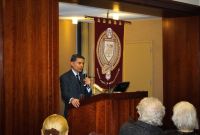By Andrew Seger

Fareed Zakaria spoke as part of the year-long series of events commemorating GSAS’s centennial anniversary. (Andrew Seger/The Fordham)
Fordham University’s Graduate School of Arts and Sciences (GSAS) welcomed CNN Host and Washington Post Columnist Fareed Zakaria to speak at its special centennial lecture.
The event was part of the year-long series of events commemorating GSAS’s 100th anniversary, along with Fordham’s 175th anniversary. At the event, Glauco Schettini, GSAS ’18, was awarded the Fareed Zakaria Summer Research Fellowship, a grant funded by Zakaria and given to a student pursuing the values of a liberal academic discipline. In his speech, Zakaria discussed the development of the American government, as well as the pitfalls of democracy throughout history. before making the block-long trip back to CNN to commentate the United State’s airstrike on Syria.
“I have to be honest, this is possibly the shortest trip I have made to make a speech in my life,” Zakaria said. “The CNN offices are… exactly one block from here.”
Zakaria came to America from India to pursue his undergraduate studies at Yale University. He explained that the American university system was very different from India’s canonical educational structure.
“I discovered in America, you could take physics and poetry and all these kinds of crazy eclectic subjects,” Zakaria said.
So he did. He majored in history at Yale, then asked himself “What is the longest visa I could get?” The answer: a doctoral program. He pursued his graduate degree in political science at Harvard University.
In his speech, Zakaria spoke about polarization and populism as two of the biggest threats to the country. He referred to author Francis Fukuyama and his book “The End of History,” calling to mind the popular 1990s sentiment that Western, liberal democracy would become the final, universally accepted form of government. Fukuyama’s theory became increasingly popular after the end of the Cold War, when nations from the communist bloc shifted towards democracy.
In the past, Zakaria said, liberal ideas and populist movements clashed, resulting in a tension that could have either democratic outcomes or fascist ones. In 13th century Britain, the Magna Carta was chartered as a check on King John in one such scenario. On the other hand, Zakaria reminded the audience that history also saw the elections of leaders like Vladimir Putin rise out of this tension between ideologies.
“And remember, Hitler was himself elected,” Zakaria said. He also spoke about America’s democratic history, and the many inequalities it posed and poses to women and minorities, even as liberal values have begun to prevail after World War II.
“We have all witnessed, recognizing it or not, a silent backlash, a silent reversal” of the post-Cold War spread of democratic values, he said. “What we now have seen is pretty much a reverse wave of de-democratization over the last 10 years,” Zakaria said. “It’s not huge, but there is no question that you have gone from an almost-inevitable, seemingly relentless movement of greater and greater democracy, and democracy spreading to more and more countries in the 1990s and the early [21st century].”
He said countries like Russia and Turkey are examples of countries where civil liberties are in jeopardy. With a finger pointed towards Africa, he said that the backlash against certain civil rights, particularly gay rights, is happening in democracies and dictatorships alike. Some democracies, he said, have seen majority groups enthusiastic to take away the rights of minority groups.
“We are now living in a more sobering movement of democracy than the…happy utopian story that we had hoped would happen in the 1990s,” he said.
Zakaria’s concern for the status of civil rights led all the way up to the White House. He called to mind one “60 Minutes” interview with President Donald J. Trump, where the interviewer asked Trump of any regrets he had for his campaign rhetoric.
Zakaria said Trump’s answer was a very revealing one: “He said, ‘No, didn’t you notice I won?’” The president’s attitude, Zakaria said, is in direct contrast with liberal democratic values.
“The essence of liberal democracy is that the end does not justify the means. The means, the processes, the institutions, the values are more important than the ends,” he said.

[…] Fordham University’s Graduate School of Arts and Sciences (GSAS) welcomed CNN Host and Washington … […]